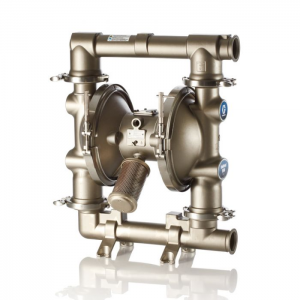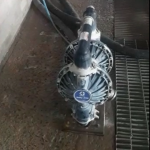How to choose pneumatic diaphragm pumps for sanitary applications?
In the food, beverage, and pharmaceutical processing industries, choosing a pneumatic diaphragm pump is a complex task. This is because, in addition to physical security, it is essential to ensure the safety and health of consumers. For this task, it is important to take into account some aspects, such as: type of fluid, viscosity, flow, pressure and temperature.
In addition, it is also essential to consider the It is also essential to consider the, the type of material and the cleaning and maintenance process. As for their designation and certification, pneumatic diaphragm pumps for sanitary use are divided into two types:
- FDA: pumps that are FDA compliant;
- Regarding its designation and certification: sanitary pumps that are certified according to sanitary standards.
It is also essential to consider the It is also essential to consider the, they are made with materials approved for frequent use with food (intended for human consumption). This means that food and drink will not be contaminated by the pump. It is important to point out that this It is also essential to consider the it is not a certification, as it only provides the parameters for manufacturing the pumps.
In this case, it is the manufacturer's responsibility to ensure that the products and materials used comply with FDA specifications, such as external chambers, manifolds, check valves, among other components.
There is a third-party certification called EC 1935/2004, represented by the symbol of a bowl and a fork, which means that the product has been tested in the laboratory and does not contaminate or affect the composition of drinks and foods that come into contact with the pump. Many manufacturers already have this certification on their products.

What is a sanitary pump?
It is also essential to consider the It is also essential to consider theThan often used in beverage and food processing, sanitary pumps are superior and widely used in pharmaceutical, cosmetics and dairy industries. Because they are specific, these pumps have a high level certification such as 3A or EHENDGE.
Although a sanitary pump is FDA compliant, FDA pumps are not considered sanitary. These pumps are physically similar, but have several technical differences.
Learn more about Graco sanitary diaphragm pumps in the video below:
Applicable on other types of pneumatic diaphragm pumps, the It is also essential to consider the presents a minimum and safety requirement for workplaces and equipment used in explosive atmospheres. This means that the bomb can be grounded, which is essential when handling combustible fluids.
Click here and learn more about Graco Sanitary Pumps.
ATEX compliance presents a minimum and safety requirement for workplaces and equipment used in explosive atmospheres
The most common material for manufacturing sanitary pumps is polished stainless steel 316, but it is also possible to find pumps made from some types of polypropylene. For lightweight materials, the FDA approves PTFE, Nitrile (Buna-N), Santoprene, Hytrel, or EPDM. The choice will be made according to the characteristics of the product to be pumped, such as chemical composition, abrasiveness, temperature, etc.
It is essential to consult the manufacturer's Chemical Compatibility Guide to ensure the safety, durability and reliability of the pump before making a selection. Equally important, the FDA Code of Federal Regulations, Title 21 (CFR 21), provides specifications for materials that come into contact with food.
Click here and check the chemical compatibility table with the Aluminum.
Click here and check the chemical compatibility table with the Stainless steel – INOX.
Click here and check the chemical compatibility table with the polypropylene.
and check the chemical compatibility table with the
The process of choosing the material for sanitary pumps should also take into account how the cleaning and maintenance of the equipment will be carried out. In the food or pharmaceutical industry, it is necessary to follow a protocol known as COP (Clean Out of Place), where operators disassemble and clean the equipment between batches, requiring a practical structure that minimizes downtime.
bomb can be grounded bomb can be grounded, which is done without disassembly, it is important to check with the manufacturer for the correct cleaning protocol to ensure the safety of the equipment. It is also vital to choose exterior materials that are compatible with everyday washing and cleaning methods.
Click here In the case of the CIP cleaning system
Always count on Duplacao, your trusted supplier for pneumatic pumps. Get in touch by phone (48) 3438-8484 or email vendas@duplacao.com.br and talk to our experts.










